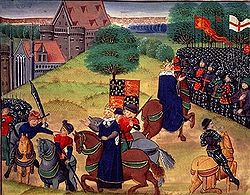- Lollards
-
Les Lollards sont les membres ou sympathisants d'un mouvement de contestation religieuse et sociale apparu en Angleterre au XIVe siècle.
« De quel droit ceux qui s'appellent seigneurs, dominent-ils sur nous ? À quel titre ont-ils mérité cette position ? Pourquoi nous traitent-ils comme des serfs ? Puisque nous descendons des mêmes parents, Adam et Ève, comment peuvent-ils prouver qu'ils valent mieux que nous, si ce n'est qu'en exploitant nos labeurs, ils peuvent satisfaire leur luxe orgueilleux ? »
Sommaire
Origine du mot
Lollards vient du moyen allemand lollaert, dont la racine lullen signifie marmonner, chantonner à voix basse.
L'appellation de Lollards fut d'abord attribuée à certains groupes d'Europe continentale (Hollandais) suspects de cacher des croyances hérétiques sous un souci d'intensifier la dévotion, mais après 1382, elle fut attribuée par dérision aux partisans de John Wyclif, auxquels elle resta attachée.
Histoire
Le premier groupe de Lollards se forma à Oxford autour de Nicolas Hereford, docteur en théologie. Le mouvement Lollard attira dans ses rangs des universitaires, des artisans, des marchands et même quelques Lords comme Lord Montacute et Lord Salisbury.
- 1381 : Sans y participer, ils contribuent par leurs prédications à une révolte des paysans dans le Sussex et le Kent. Nobles et clercs sont massacrés. Londres est envahi. Cette révolte est durement réprimée par Richard II.
- 1382 : Bible entière traduite, pour la première fois, dans la langue vernaculaire de l'Angleterre. Les Lollards veulent la pratique d'une foi simple et « évangélique » : tout homme doit avoir le libre accès aux Écritures dans sa propre langue.
- 1395 : Requête des Douze Conclusions demandant au parlement l'abolition du célibat des prêtres, de la transsubstantiation, des prières pour les morts, des offrandes faites aux images, de la confession et de plusieurs autres pratiques considérées comme des abus de l’Église catholique romaine.
- 1399 : Avènement d'Henri IV, vague de répression contre l'hérésie. Thomas Arundel, l'archevêque de Cantorbéry est l'adversaire le plus déterminé des Lollards.
- 1401 : Un décret De haeretico comburendo les condamne au bûcher. Le premier martyr Lollard, William Sawtrey, prêtre à Saint Syth’s de Londres, fut brûlé le 26 février quelques jours après cet événement.
- 1414 : Soulèvement Lollard dirigé par Sir John Oldcastle (Lord Cobham). Fut rapidement écrasé par Henri V.
- 1417 : Mort de Sir John Oldcastle. Les Lollards sont contraints à la clandestinité. Leur influence se maintient dans les campagnes au-delà des années 1500.
Ce mouvement annonce certaines idées de la Réforme protestante et dispose favorablement l'opinion à accueillir la séparation de l'Église d'Angleterre d'avec Rome, décidée par Henri VIII en 1534.
Dans la littérature
- La révolte de 1381 est mise en scène par Shakespeare dans Richard II
Voir aussi
Articles connexes
Liens externes
- Musée virtuel du protestantisme francais
- (en) New Advent Encyclopédie catholique, article consacré aux Lollards
Notes et références
Catégories :- Histoire de la Réforme
- Histoire de l'Angleterre
- Controverse en religion
- Adversaire de la peine de mort
Wikimedia Foundation. 2010.

